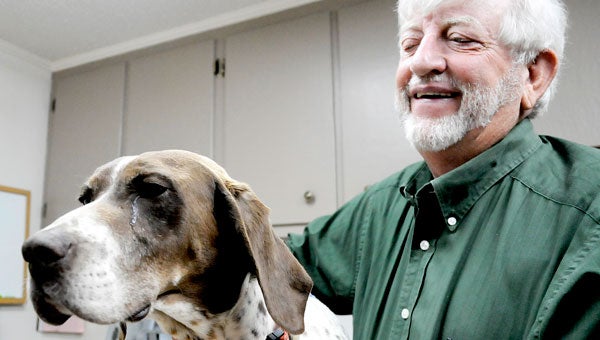Rabies vaccinations key to keeping pets healthy
Published 9:17 pm Friday, May 16, 2014

Dr. Lee Youngblood, rabies inspector for Dallas County, said now is the time to get household pets started on preventative care. (Christopher Edmunds | Times-Journal)
By Christopher Edmunds
The Selma Times-Journal
While summer can be a time for fun in the sun, the seasonal heat presents several dangers for local dogs.
Dr. Lee Youngblood, rabies inspector for Dallas County, has practiced as a veterinarian for 44 years. He said now is the time to get household pets started on preventative care.
“One important part of preventative care is vaccination,” Youngblood said. “Rabies vaccine is very effective, and we put on a rabies clinic where we go out to different areas in the county and offer rabies vaccines.”
The Dallas County Health Department will be conducting vaccinations through the North Animal Hospital Rabies Clinic in several locations on Saturday for a fee of $10.
Rabies is a viral disease that affects the brain, and it can be transmitted from any warm-blooded mammal to another warm-blooded mammal.
“The pet is the potential transmitter from wildlife rabies reservoirs, particularly raccoons and foxes,” Youngblood said. “If a person or animal has contacted rabies virus, they go through a series of symptoms that people are sort of familiar with, like biting, salivating and attacking.”
Another summertime threat for pet health is the increased risk of heartworms, a disease carried by mosquitoes.
Dallas County is designated as and endemic area, meaning the disease is a constant danger for local pets, Youngblood said.
“There is more exposure during the summertime when the mosquitoes are out. There is no question about that,” he said. “But we see cases year-round because once they are infected by the mosquito, it may take up to six to eight months to see the heartworms.”
Youngblood said the best way to prevent serious infection of both the pet and its owner is to start early.
“Puppies need to start as soon as six weeks of age on the vaccination procedure,” he said. “If you get a puppy and don’t know what to do, call your veterinarian. Don’t wait around until your puppy gets sick.”
Youngblood also offered several tips to keep dogs healthy during the summer by preventing heat stroke.
While some people believe that a dog’s fur acts as insulation from summer heat, Youngblood was quick to dispel the rumor.
“A heavy coat traps heat and makes it harder for the dog to cool down,” he said. “They don’t sweat. Dogs cool down in two rays: radiation out from the skin and respiration. That’s why you see them huffing. That’s their air conditioning at work.”
Another way to prevent heat stroke is to make sure pets are not left inside vehicles.
“The temperature inside a car can reach staggering temperatures in a short period of time,” Youngblood said. “Leaving a window cracked doesn’t make any difference.”
Although summer heat may present an increase in health risks to pets and owners, Youngblood encouraged people to go out and enjoy time with their pets.
“In today’s world, pets are like our children,” he said. “They provide us with happiness, but we need to take care of them.”





